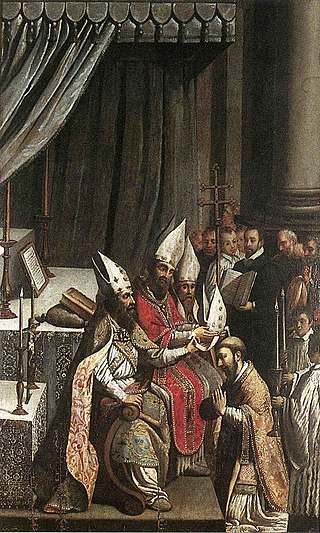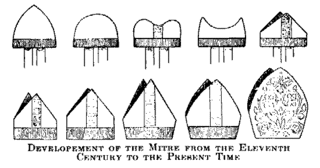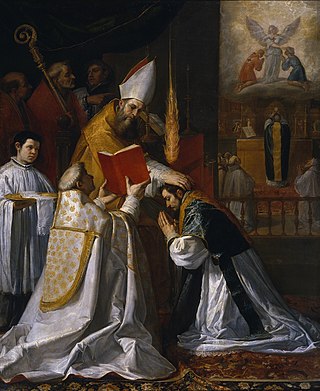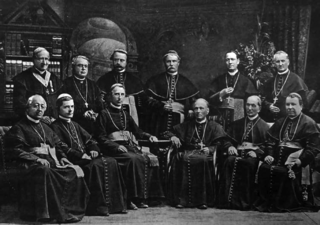
Apostolic succession is the method whereby the ministry of the Christian Church is held to be derived from the apostles by a continuous succession, which has usually been associated with a claim that the succession is through a series of bishops. Those of the Anglican, Church of the East, Eastern Orthodox, Hussite, Moravian, Old Catholic, Oriental Orthodox, Catholic and Scandinavian Lutheran traditions maintain that "a bishop cannot have regular or valid orders unless he has been consecrated in this apostolic succession". These traditions do not always consider the episcopal consecrations of all of the other traditions as valid.
A bishop is an ordained member of the clergy who is entrusted with a position of authority and oversight in a religious institution.
Called to Common Mission (CCM) is an agreement between The Episcopal Church (ECUSA) and the Evangelical Lutheran Church in America (ELCA) in the United States, establishing full communion between them. It was ratified by the ELCA in 1999, the ECUSA in 2000, after the narrow failure of a previous agreement. Its principal author on the Episcopal side was theological professor J. Robert Wright. Under the agreement, they recognize the validity of each other's baptisms and ordinations. The agreement provided that the ELCA would accept the historical episcopate and the "threefold ministry" of bishop - priest - deacon with respect to ministers of communicant churches serving ELCA congregations; the installation of the ELCA presiding bishop was performed through the laying on of hands by Lutheran bishops in the historic episcopate. This provision was opposed by some in the ELCA, which after its founding merger in 1988, held a lengthy study of the ministry which was undertaken with divided opinions. In response to concerns about the meaning of the CCM, synod bishops in the ELCA drafted the Tucson resolution which presented the official ELCA position. It made clear that there is no requirement to ordain deacons or accept their ministry. It also provided assurance that the ELCA did not and was not required by CCM to change its own theological stance.
In Christianity, an episcopus vagans is a person consecrated, in a "clandestine or irregular way", as a bishop outside the structures and canon law of the established churches; a person regularly consecrated but later excommunicated, and not in communion with any generally recognized diocese; or a person who has in communion with them small groups that appear to exist solely for the bishop's sake.

An episcopal polity is a hierarchical form of church governance in which the chief local authorities are called bishops. It is the structure used by many of the major Christian Churches and denominations, such as the Catholic, Eastern Orthodox, Oriental Orthodox, Church of the East, Anglican, Lutheran and Methodist churches or denominations, and other churches founded independently from these lineages.

In certain Christian denominations, holy orders are the ordained ministries of bishop, priest (presbyter), and deacon, and the sacrament or rite by which candidates are ordained to those orders. Churches recognizing these orders include the Catholic Church, the Eastern Orthodox, Oriental Orthodox, Anglican, Assyrian, Old Catholic, Independent Catholic and some Lutheran churches. Except for Lutherans and some Anglicans, these churches regard ordination as a sacrament.

Clergy are formal leaders within established religions. Their roles and functions vary in different religious traditions, but usually involve presiding over specific rituals and teaching their religion's doctrines and practices. Some of the terms used for individual clergy are clergyman, clergywoman, clergyperson, churchman, ecclesiastic, and cleric, while clerk in holy orders has a long history but is rarely used.

The Church of Sweden is an Evangelical Lutheran national church in Sweden. A former state church, headquartered in Uppsala, with around 5.6 million members at year end 2021, it is the largest Christian denomination in Sweden, the largest Lutheran denomination in Europe and the third-largest in the world, after the Ethiopian Evangelical Church Mekane Yesus and the Evangelical Lutheran Church in Tanzania.

Ordination is the process by which individuals are consecrated, that is, set apart and elevated from the laity class to the clergy, who are thus then authorized to perform various religious rites and ceremonies. The process and ceremonies of ordination vary by religion and denomination. One who is in preparation for, or who is undergoing the process of ordination is sometimes called an ordinand. The liturgy used at an ordination is sometimes referred to as an ordination.
Clerical celibacy is the requirement in certain religions that some or all members of the clergy be unmarried. Clerical celibacy also requires abstention from deliberately indulging in sexual thoughts and behavior outside of marriage, because these impulses are regarded as sinful.
Independent Catholicism is an independent sacramental movement of clergy and laity who self-identify as Catholic and form "micro-churches claiming apostolic succession and valid sacraments", in spite of not being affiliated to the historic Catholic churches such as the Roman Catholic and Utrechter Old Catholic churches. The term "Independent Catholic" derives from the fact that "these denominations affirm both their belonging to the Catholic tradition as well as their independence from Rome."
Apostolicae curae is the title of a papal bull, issued in 1896 by Pope Leo XIII, declaring all Anglican ordinations to be "absolutely null and utterly void". The Anglican Communion made no official reply, but the archbishops of Canterbury and York of the Church of England published a response known by its Latin title Saepius officio in 1897.
The Free Church of Antioch is one of several "Malabar Rite" Independent Catholic Churches which claims valid lines of apostolic succession in the historical episcopate which is not in union with the Catholic Pope in Rome or any Orthodox Patriarch. The Free Church of Antioch received several lines of this succession through its founder, the late Archbishop Warren Prall Watters (1890-1992). The Free Church of Antioch was established on October 4, 1992, in Santa Barbara, California, and was incorporated in that state through The Center For Esoteric Studies, of which Archbishop Watters was the Founder and Director.
The Convergence Movement, also known as the Ancient-Future Faith movement, is a Protestant Christian movement that began during the Fourth Great Awakening (1960–1980) in the United States.

In the Catholic Church, a bishop is an ordained minister who holds the fullness of the sacrament of holy orders and is responsible for teaching doctrine, governing Catholics in his jurisdiction, sanctifying the world and representing the Church. Catholics trace the origins of the office of bishop to the apostles, who it is believed were endowed with a special charism and office by the Holy Spirit at Pentecost. Catholics believe this special charism and office has been transmitted through an unbroken succession of bishops by the laying on of hands in the sacrament of holy orders.

The Christian Episcopal Church (XnEC) is a Continuing Anglican jurisdiction consisting of parishes in Canada and the United States and with oversight of several parishes in the Cayman Islands. Its bishops are in apostolic succession through the Right Rev. A. Donald Davies. Davies was formerly the bishop-in-charge of the Convocation of American Churches in Europe and the bishop of the Episcopal Diocese of Fort Worth, Texas.
The historic or historical episcopate comprises all episcopates, that is, it is the collective body of all the bishops of a church who are in valid apostolic succession. This succession is transmitted from each bishop to their successors by the rite of Holy Orders. It is sometimes subject of episcopal genealogy.

Anglican interest in ecumenical dialogue can be traced back to the time of the Reformation and dialogues with both Orthodox and Lutheran churches in the sixteenth century. In the nineteenth century, with the rise of the Oxford Movement, there arose greater concern for reunion of the churches of "Catholic confession". This desire to work towards full communion with other denominations led to the development of the Chicago-Lambeth Quadrilateral, approved by the Third Lambeth Conference of 1888. The four points were stipulated as the basis for church unity, "a basis on which approach may be by God's blessing made towards Home Reunion":
A personal ordinariate for former Anglicans, shortened as personal ordinariate or Anglican ordinariate, is an ordinariate, a canonical structure within the Catholic Church established in order to enable "groups of Anglicans" and Methodists to join the Catholic Church while preserving elements of their liturgical and spiritual patrimony.
Robert David Redmile is the second Bishop of Richmond of the Christian Episcopal Church of Canada, having succeeded the Primate, and first Bishop of Richmond, Donald Davies, as the second bishop of the diocese, in 2004.









